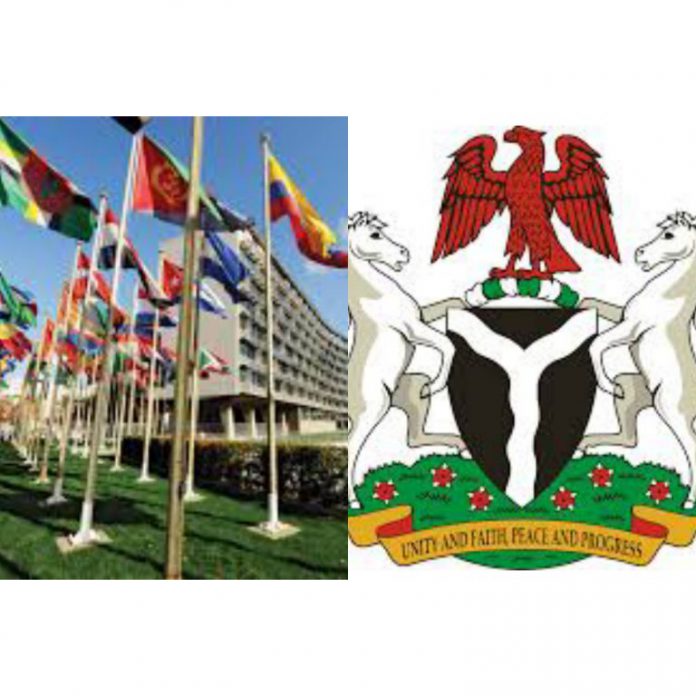The Federal Ministry of Education has donated ten industrial sewing machines worth N2.7m to the Pilot School Sewing Competition an initiative of the Ladi Memorial Foundation (LMF).
The Pilot School Sewing Competition is funded by United Nations Educational, Scientific and Cultural Organisation (UNESCO) with counterpart funding from would-be cosponsors.
The permanent secretary in the ministry Mr Andrew David Adejo made the donation when he hosted the board of the LMF who was on a courtesy visit where they presented the implementation brief of the UNESCO-supported ‘Strengthening Stakeholders’ Support for Vocational Education and Training (VET) Through Incentivised Pilot Schools Sewing Championship Project (SSCP) 2022.
Mr Adejo pointed out that the greatest challenge facing the country is the quest for white-collar jobs which he said needs to be dealt with in the sensitisation for Vocational Education and training.
“I say this because since I became permanent secretary, I have been arguing with the Academic Staff Union of Polytechnics. They are coming up with a proposal that Polytechnics should offer degree programmes.”
According to him, those that want a degree should go to the university.
Speaking against the backdrop that the Polytechnic system was conceived to produce middle-level manpower, mostly technicians.
Speaking further, Adejo said, “It is unfortunate, if you allow every Nigerian, he will create an institution for everything. When they see pure water business doing well everybody will rush there.
“The way to change that mindset is to embrace what you are doing. I’m sorry our generation was guilty of this; nobody thought of polytechnic as an option when thinking of admission to higher institutions. No, it’s university straight.
“But it is clear that is not working for us, so we have to embrace vocational and technical education.
My experience in the Ministry of Education is that we should galvanise NFOs like this, galvanise CSOs even if it is to give little support here and there.
“That will help, but not doing it as government; we don’t have that capacity.”
He personally donated 5 manual sewing machines to the project.
The Executive Director of Ladi Memorial Foundation, Honourable Rosemary Ojochenemi Osikoya indicated that the Pilot Schools Sewing Championship Project 2022 initiative is designed to sensitise the general public and targeted stakeholders on the benefits of Vocational education/
livelihood skills development.
This she said will contribute to sharpening perception and reducing stigmatisation associated with vocational education, while same time providing a credible interactive platform to incentivize young adults of school age to commit to the acquisition of functional vocational skills.
Osikoya explained further that it will canvass wider stakeholders’ support to funding schools’ vocational workshops as a sustainable strategy to engender stakeholders’ buy-in, participation and ownership of vocational education.
She said the project objectives are to provide a competitive and engaging platform for incentivizing positive competition amongst young people of school age
“Motivate and harness creativity among young adults, identifying and promoting talented young skilled artisans/craftsmen of school age.
“Broker industry – schools’ collaboration and partnership to strengthen vocational workshops in schools/ communities and engender public participation and ownership of vocational education.
“Engage the creativity, innovative trait and boundless energy of young adults in a profitable, productive, rewarding and incentivized engagement
performance.
“Inculcate positive work values and sense of community service in young adults through team effort, good friendship and positive work group cooperation.
“What we want to do now is a competition that is like a play between young people.
Things like Big Brother Nigeria are not actually improving the morals of the younger ones. Schools do inter-house sports, and they do Maths and English competitions that is in terms of quiz, but in terms of skills, there is no platform for schools to compete among themselves.
“Young people are very competitive but nobody is tasking their creativity and so the idea of this is like a school support activity that students would begin to Learn through plays, to compete by themselves and it creates a platform where young people compete among themselves
“Sewing is like the simplest of all mechanised core subjects if it is cooking you begin to look for pot and water and stove but if it is a manual sewing machine, you put it on the ground and anybody can use it.
“It is a livelihood skill, what we need for survival. Now that the dollar is high how many Nigerians can sew for themselves but this is to encourage people to now become more interested in sewing
“The UBEC law says that before they finish JSS3 they should have skills for labour but in the present time, it is not true as most of those that have finished from junior secondary school can not have employment by skills.
She said the idea is to advocate and promote skill and then first thing is to get people whether they are in government or not in government or company, to adopt a school and help them get equipment because the problem is that schools do not have access to sewing machines.
“So we want this project to be an opportunity at least every year across Nigeria people can donate equipment like we are asking for now, people can contribute to sensitisation and awareness and then also encourage people to come back not because of violence, Endsars or pregnancy, you bring them together for skill.
According to her, it is an initiative of the Ladi Memorial Foundation funded by UNESCO, adding that what the ministry of education and other stakeholders would be doing is counterpart funding.
“It is important to highlight that the FCT is in partnership and it is hosting the competition which cuts across all schools, public/private, junior, senior secondary schools and even young adults between the age of 12 and 20 who are not in school.









